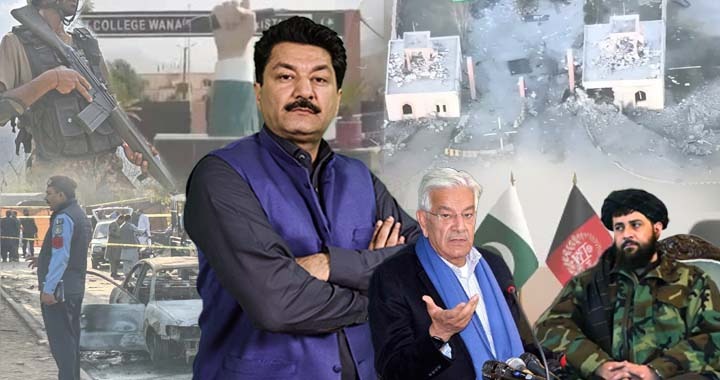The sudden surge in terrorist attacks across Pakistan is neither random nor coincidental. From the suicide bombing at Islamabad’s district court to the coordinated strike on Cadet College Wana in South Waziristan, the pattern reflects a dangerous escalation designed to terrorise and destabilise. These are not isolated incidents. They are calculated moves, emerging at a time when Pakistan and Afghanistan’s diplomatic and security engagements remain deadlocked.
Whenever ceasefire efforts or negotiations begin, history tells us that terror outfits use the lull to reorganise and rearm. The recent rounds of talks between Pakistan and the Afghan Taliban, first in Doha and later in Istanbul, collapsed without progress. Pakistan’s key demand was clear: that Afghan soil must not be used for terrorism inside Pakistan. Kabul’s response, however, was evasive, claiming that attacks in cities far from the border cannot be their responsibility. Yet, since October 28, the Afghan Taliban have neither condemned nor acknowledged a single incident that has taken innocent Pakistani lives.
Meanwhile, videos continue to appear on social media showing masked men claiming to operate inside Pakistan, often linked with groups tied to the banned TTP. These videos aim to create the impression that terrorists are based within Pakistan’s territory, deflecting blame from their real sanctuaries across the border. But facts speak otherwise. When terrorists strike deep inside the capital, in Islamabad; a city protected by layers of security and home to Pakistan’s key institutions, including the Parliament, Supreme Court, and foreign embassies — serious questions arise: Who brought the bomber here? Who facilitated him? What routes did he use?
These attacks are not spontaneous. They are part of a wider plan, a reaction to Pakistan’s stance and its consistent warnings to Kabul. Our security institutions, fully aware of the potential backlash from failed talks, were mentally prepared for such strikes. Yet, preparedness does not eliminate risk. The presence of facilitators within Pakistan, working in coordination with handlers across the border, remains a grave concern.
The Defence Minister’s statement directly holding Kabul responsible, and the Interior Minister’s confirmation that the Wana attack was orchestrated from across the border, cannot be ignored. Evidence points toward operational support and communication links between attackers and their handlers in Afghanistan. One of the intercepted audios from the Wana incident even carried a distinct Afghan accent, raising further suspicion.
While investigations continue, the fact remains that no group has claimed responsibility for either the Islamabad or Wana attacks. This silence itself is telling. Terror outfits may be deliberately avoiding public claims to blur responsibility and evade accountability. It is a calculated move, one that allows them to continue attacks while maintaining plausible deniability for their benefactors across the border.
The Wana assault in particular bears chilling resemblance to the Army Public School tragedy, an attempt to inflict maximum casualties among young cadets and to break the nation’s spirit. But unlike APS, the swift response of Pakistan’s security forces and the extraordinary courage of the cadets prevented a far greater tragedy. Two attackers were eliminated at the entrance, and the remaining operation continues until the last terrorist is neutralised. The cadets, displaying remarkable calm and unity, stood firm, their resilience a reflection of Pakistan’s unbreakable spirit.
These incidents, however, cannot be viewed in isolation. There are broader regional undercurrents. Following India’s failed Operation Sindoor in May 2025 and Pakistan’s decisive response through Operation Bunyan al-Marsoos, New Delhi knows direct confrontation is futile. Instead, India is pursuing indirect warfare, using Afghan soil and funding its proxies to hurt Pakistan from within. The timing of India’s own internal explosions, like the recent one near Delhi’s Red Fort, further complicates the narrative. While Indian media predictably resorted to anti-Pakistan rhetoric, eyewitnesses on the ground contradicted official claims, describing it as a cylinder blast. Yet, Indian agencies swiftly rounded up local suspects, trying to connect them to Pakistan without any evidence.
This duality, condemning violence at home while enabling it across the border, exposes India’s hypocrisy. It also underlines how India exploits strained Pakistan-Afghanistan relations to fuel instability in the region. Whenever there is friction between Islamabad and Kabul, India steps in to widen the gap, providing financial and logistical support to groups hostile to Pakistan.
Let there be no doubt: Pakistan’s security apparatus remains alert on both eastern and western fronts. The armed forces are well-disciplined, capable, and prepared. However, the challenge within is more complex; guerrilla warfare, suicide attacks, and hybrid tactics cannot be countered by conventional defence alone. Strengthening intelligence coordination and preemptive detection are critical. Even the most advanced nations, including the United States, could not prevent 9/11 despite massive resources. The key is constant improvement, vigilance, and national unity.
Pakistan today stands at a crucial juncture. The country is facing external enemies and internal facilitators, both trying to break its resolve. But the resilience shown in Wana, the composure of young cadets in the face of terror, and the unwavering commitment of our security forces prove that Pakistan will not be cowed. This is not just a fight for territory or security — it is a fight for our future, our youth, and our national dignity.





